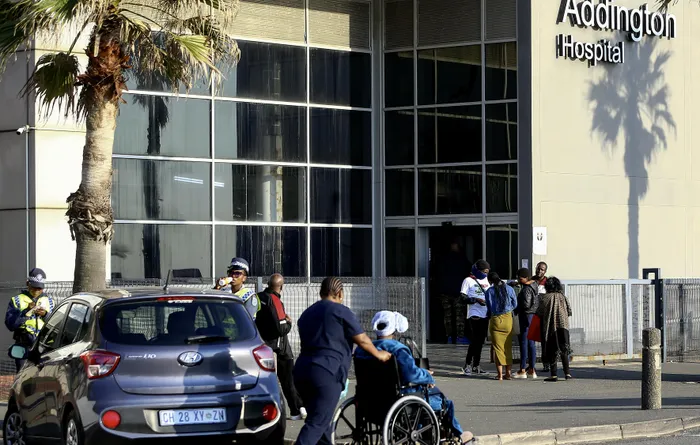
At Durban’s Addington Hospital, the March and March movement has demanded that patients show their ID documents before they are allowed into the facility.
Image: Leon Lestrade / Independent Newspapers
Claims of healthcare discrimination against refugees and asylum seekers in South Africa have ignited tensions between refugee organisations and Operation Dudula.
While refugee leaders assert that both vigilante groups and some health workers are blocking access to medical services, Operation Dudula maintains that its campaign does not target individuals with valid documentation and insists such actions contradict its principles.
Both Operation Dudula and the March and March movement have been stationed outside hospitals and clinics in recent weeks demanding that patients show them identity documents before they can access services.
Eric Jean Butoki Madel, acting chairperson of the Southern Africa Refugee Organisations Forum, stated: “The denial of access to health facilities is affecting refugees and asylum seekers more as they are all assumed to be illegal migrants. As long as you are not a native South African, you are automatically illegal, especially if you are a Black African.”
Madel warned that the consequences are severe, particularly for those reliant on chronic medication. “The challenges are that people who have been collecting chronic disease medications are at high risk as they are unable to collect their medications. Children who are supposed to be vaccinated are not. Some people have lost their lives because they were denied access to hospitals.”
He added that discrimination is occurring even without Dudula’s direct presence. “We have received specific reports that some nurses at clinics, even if there are no members of Operation Dudula or March and March, are turning refugees and asylum seekers away. In Clare Estate, Durban, a nine-month pregnant woman with valid documentation was refused entry not by the vigilante group members but by a nurse.”
He described the denial of healthcare as a breach of law. “The denial of healthcare to documented refugees is a total violation of fundamental human rights, the Constitution of the country, local and international laws, and mostly refugee law. In my view, if the South African government feels it can no longer protect refugees in the country, it should openly declare that and engage the United Nations High Commissioner for Refugees (UNHCR).”
Madel also shared personal examples. “A well-known refugee community member who is a naturalised South African from the Congo and has been living in South Africa for more than 25 years was denied access to collect chronic medications for her 14-year-old South African-born child. My own child was turned away from receiving a three-year injection at the clinic.”
Operation Dudula rejected claims that its campaigns target documented migrants. “We fully respect the rights of documented refugees and asylum seekers who are legally entitled to access healthcare in South Africa. Our movement does not advocate denying medical services to individuals with valid documentation.”
The movement stated that discrimination in clinics is not aligned with its principles. “Operation Dudula does not condone discrimination against documented refugees or asylum seekers. Any health worker refusing treatment citing our influence is acting against our directives.”
It acknowledged constitutional and international obligations. “We recognise that denying healthcare to documented individuals violates South Africa’s Constitution and international refugee law. Operation Dudula’s stance is consistent with these laws: our campaigns target illegal activities, not the rights of those lawfully residing in the country.”
The national Health department has previously said anyone with information regarding healthcare workers or security guards blocking access to facilities should report it.
Related Topics: